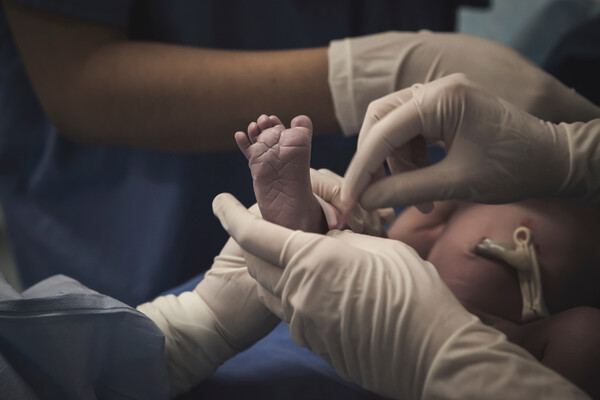
A court has awarded a gynecologist about 1.25 billion won ($976,860) in compensation for delayed treatment that left a newborn with cerebral palsy.
However, the medical community expressed concern that the ruling would speed up the collapse of the baby delivery infrastructure.
On May 4, the Pyeongtaek branch of the Suwon District Court ordered the obstetrician to pay the patient and her family 1.25 billion won plus delayed interest in a lawsuit against him for causing a newborn’s cerebral palsy.
In November 2016, the prospective mother who filed the lawsuit visited the hospital for a non-stress test (NST) one day before her scheduled induction delivery because she felt her fetus’ movement was weak. A nurse checked the fetus and performed the NST.
The pregnant woman was admitted to the hospital at around 11:30 p.m. The medical staff at the hospital became aware of the fetal distress situation around 1 a.m. the following day, about an hour and a half later. The doctor, an obstetrician-gynecologist who performed the delivery, personally checked the mother’s condition at around 1:12 a.m.
The plaintiff claimed that the medical personnel at the hospital neglected to observe her condition by not checking the NST results in real time and that they “failed to take appropriate measures on time by delivering her late after she developed fetal distress.” The medical record reviewer, in this case, presented an opinion that the woman went into fetal distress at around 0:27-O:33 a.m., about an hour after her visit.
The court accepted this and found the gynecologist’s negligence.
“If the specialist, not the nurse, had examined the woman immediately after the visit to determine whether and to what extent the fetal distress had decreased, further tests would have been carried out,” the court said. “And, if further tests had detected the fetal distress sooner, it was likely that measures would have been taken on time.”
The medical examiner in the insurance claim also said, “There were aspects of the hospital’s negligence after the visit. Unfortunately, the doctor did not intervene immediately when the NST test showed a loss of rhythm. The treatment of the medical staff at the hospital was insufficient.”
In response, the obstetrician-gynecologist said, “I didn't think it was particularly urgent because the fetus could be sleeping.”
The court said in conclusion, “The doctor should have considered the possibility of fetal distress immediately on arrival and taken steps to examine A directly and confirm (the presence of fetal distress). He should have continued to closely measure and observe the condition of the mother and fetus and be prepared to respond immediately, but he neglected to do so.”
It went on to say, “However, the plaintiff was a lightly pregnant woman who had already given birth at the hospital. It was difficult for the doctor to foresee any abnormalities in the delivery process. In addition, after the mother arrived at the delivery room, the doctor took appropriate and prompt action and tried to resuscitate the newborn after delivery.”
The court limited the liability to 70 percent. Accordingly, the court sentenced the obstetrician to pay 1,255,522,190 won – 1,171,522,190 won in compensation, and 84 million won in alimony – to the plaintiff.
‘Harsh punishment of even goodwill medical practice accelerates collapse of delivery infrastructure'
When the verdict was announced, the medical community expressed concern that it would accelerate the collapse of the baby delivery infrastructure. The medical community believes that the heavy punishment of medical staff for unavoidable medical accidents has led to a reluctance to deliver babies in maternity hospitals.
“This ruling has undermined the morale of obstetricians and gynecologists who silently keep the delivery room amid difficult environment,” the Korean Association of Obstetricians and Gynecologists said Monday. “It will make them provide defensive care that accompanies no responsibility or avoid deliveries as much as possible.”
The association pointed out that childbirth is an inherently risky medical practice. There will inevitably be occasions when a healthcare provider, despite exercising due care, cannot avoid the death of the mother, fetus, or newborn, or cerebral palsy in the newborn, it noted.
It emphasized that rulings that do not consider this make maternity infrastructure worse. By harshly punishing even well-intentioned medical practices and awarding astronomical damages, the society discourages the practice of childbirth and strains the finance of hospitals, resulting in a poorer delivery infrastructure,” it added.
"It is therefore imperative that tribunals handling medical malpractice cases at all levels of courts across the country, including the tribunal in this case, render fair and reasonable judgments,” the association emphasized.

